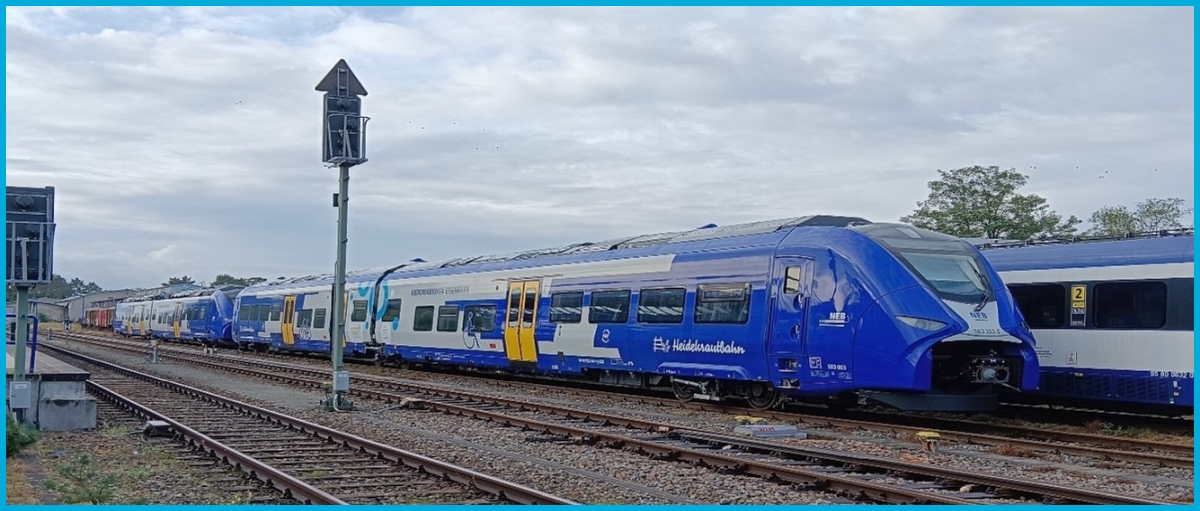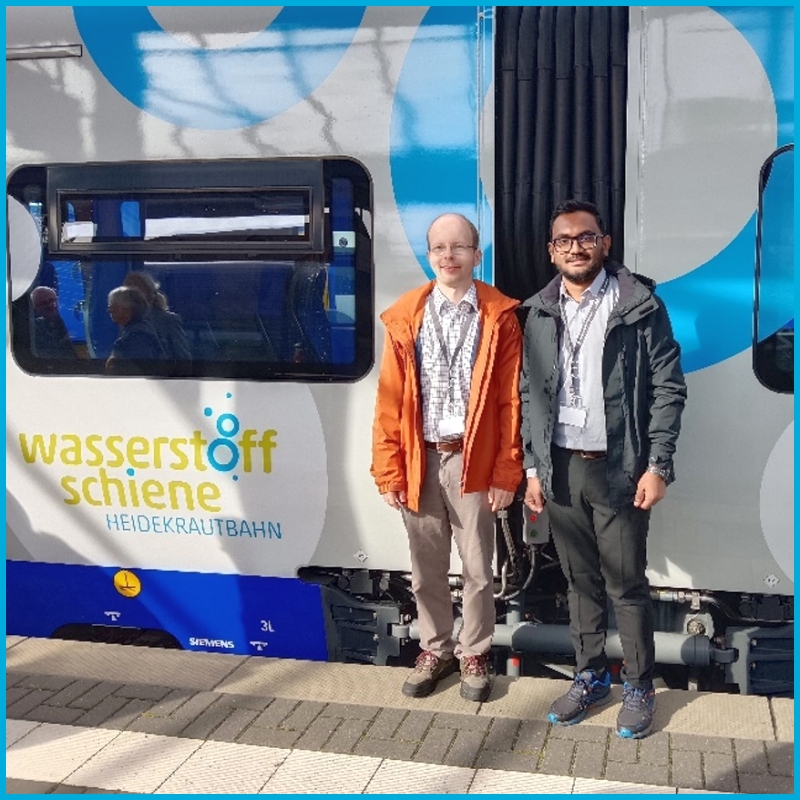New Staff Member
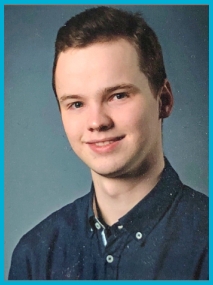
Cottbus, January 5, 2026
Hello! My name is Malcolm A. Deuse, and I am very pleased to be working as a laboratory assistant at BTU Cottbus–Senftenberg at the Chair of Thermal Energy Technology from January 2026 onwards. I am a trained physics laboratory technician and completed my vocational training at Glasmanufaktur Brandenburg GmbH in Tschernitz. Subsequently, I was employed at SGS Analytics GmbH in Jänschwalde and am now working at BTU.
New Staff Member
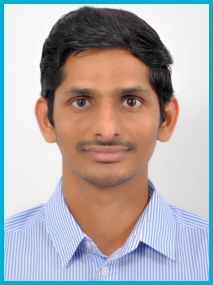
Cottbus, September 1, 2025
Hello! My name is Charath Krishna Jarubula, and I am excited to be joining as an academic staff member at the Chair of Thermal Energy Technology at BTU from September 2025. I recently completed my Master of Science in Power Engineering at BTU, where my thesis focused on the development and performance validation of anion-exchange membrane water electrolysis (AEMWE), particularly analysing the current-voltage (I-V) characteristics of the cell. Prior to this, I worked as a student assistant in the EIZ project at the chair, where I gained hands-on experience in modelling and technical aspects of different water electrolyser technologies. Now, as a member of BTU's Energy Innovation Centre (ESC-Lab), my research will focus on optimising electrolyser performance and advancing green hydrogen technologies. A key part of my work involves 3D analysis of AEMWE, allowing detailed simulation studies to enhance the system’s efficiency and performance. I am eager to collaborate with the dedicated research teams, contribute to meaningful research outcomes and support the development of sustainable AEM systems. I am passionate about developing innovative clean energy solutions, supporting the global energy transition and continuing my personal and professional growth as a researcher in the field of green hydrogen. I look forward to engaging with the academic community at BTU and actively contributing to its vibrant research environment.
New Staff Member

Cottbus, July 15, 2025
Greetings! My name is Spandana Gonuguntla, and I am delighted to be joining BTU as an academic staff member with the Chair of Thermal Energy Technology, starting on 15 July 2025. I recently completed my PhD in Chemical Sciences at CSIR–IICT, India. My doctoral research primarily focused on the "Engineering of novel metal oxide/MOF-based semiconductor materials for photocatalytic hydrogen generation and environmental remediation". As part of the Energy Innovation Centre (EIZ-ESC), my research at BTU will be primarily devoted to the development of membrane electrode assemblies using noble metal-free catalysts and advanced membrane materials. I am particularly keen to gain and apply hands-on experience with electrochemical systems and to further develop my expertise in this field. A key aspect of my work will involve the optimisation of electrode systems incorporating noble metal-free catalysts to enhance their durability and long-term stability—both in single-cell and five-cell stacks of anion exchange membrane (AEM) water electrolysers. Through this research, I aim to contribute to improving the efficiency and sustainability of AEM technologies. I am passionate about advancing clean energy solutions and look forward to collaborating with the many talented research teams at BTU. I am eager to contribute to the university’s ongoing efforts in the field of energy transition, and I also look forward to engaging with the wider academic community at BTU, while continuing to grow as an independent researcher.
New Staff Member
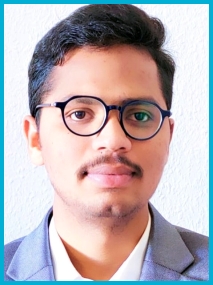
Cottbus, July 8, 2025
Hello and welcome! My name is Gopal Reddy Dandigam, and I am excited to join Brandenburg University of Technology (BTU) as a Research Engineer at the Chair of Thermal Energy Technology, starting July 1. I hold a Master of Science degree in Environmental and Resource Management, where I focused my thesis on "Experimental Investigations of Innovative Electrode & Separator Materials in an Alkaline Pressurized Electrolysis Cell." As a member of the Energy Innovation Center (EIZ), my research centers on the development and testing of membrane electrode assemblies that utilize noble metal-free catalysts and advanced membrane materials. A significant part of my work involves evaluating and optimizing their performance in both single-cell and five-cell stacks of Anion Exchange Membrane (AEM) water electrolyzers. Through this, I aim to contribute to advancing efficient and sustainable AEM systems. I am eager to collaborate with the talented research team at BTU and actively engage with the university’s vibrant academic community. My long-term passion lies in driving clean energy solutions and supporting the global energy transition through innovative and impactful research. I look forward to growing as a researcher and making meaningful contributions to sustainable technology and energy innovation.
New Staff Member
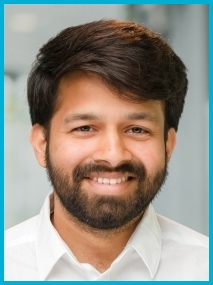
Cottbus, June 2, 2025
Greetings! My name is Sai Ram Vissavajhala, and I am excited to be joining BTU Cottbus-Senftenberg as an academic staff member with the Chair of Thermal Energy Technology starting on June 2, 2025. I recently completed my Master of Science in Power Engineering at BTU. My master’s thesis focused on the modeling and simulation of electrochemical ammonia synthesis, with an emphasis on surface kinetics and reaction mechanisms under standard conditions. As a member of the EU project PEACE (Pressurized Efficient Alkaline EleCtrolysEr), I look forward to gaining hands-on experience with electrochemical systems and further developing my expertise in electrolysers and green hydrogen technologies. I am eager to contribute to the PEACE project and collaborate closely with the research team. In the long term, I am passionate about advancing clean energy solutions and hope to contribute to research that supports energy transition. I also look forward to engaging with the academic community at BTU and continuing to grow as a researcher.
Now Available: Our New Guide on the Heidekrautbahn and Hydrogen-Powered Trains!
Cottbus, February 21, 2025
Environmentally friendly, innovative, and forward-looking – an exciting pilot project is set to launch on the Heidekrautbahn at the end of 2024: hydrogen-powered hybrid fuel cell trains of the Siemens Mobility Mireo Plus H type will be introduced on the RB 27 regional rail line for the first time. These trains run on green hydrogen, which is produced regionally using wind and solar energy. To provide deeper insights into this project and highlight the potential of hydrogen-based rail operations, we have developed a comprehensive guide. In this guide (in German), you will learn more about:
- The technology behind the new trains: From fuel cell propulsion to the use of green hydrogen.
- The impact on the region: How this initiative will sustainably transform the Barnim and Oberhavel districts.
- The research project: Scientific monitoring by the German Aerospace Center (DLR) and Brandenburg University of Technology Cottbus-Senftenberg (BTU).
- The project’s goals: CO₂-free rail operations and cost-effective alternatives to diesel-powered trains.
- Lessons Learned: Insights gained from the project phases of preparation, approval, and implementation.
Our guide is aimed at all those interested in learning more about the future of environmentally friendly rail transport. Download the guide now and join us on the journey toward sustainable mobility!
On September 25, 2024, a milestone for the future of emission-free mobility was reached at Basdorf station. A significant step toward the future of emission-free mobility was achieved on September 25, 2024, at Basdorf Station: the ceremonial inauguration of the Mireo Plus H hydrogen train, manufactured by Siemens Mobility, took place with broad participation from industry, research, and the public. The hydrogen train is the centerpiece of the innovative Heidekrautbahn project, which was realized through close collaboration between industrial and research partners. The Heidekrautbahn project is a prime example of the transition toward sustainable mobility. It is operated by the industrial partners ENERTRAG SE, Kreiswerke Barnim GmbH, and Niederbarnimer Eisenbahn (NEB). At the same time, it is scientifically supported by the Department of Thermal Energy Technology at BTU Cottbus-Senftenberg and the DLR Institute for Vehicle Concepts.
The Contribution of BTU Cottbus-Senftenberg
A particularly noteworthy aspect is the contribution of the Chair of Thermal Energy Technology at BTU Cottbus-Senftenberg. Our academic staff members, Frank Gillung and Krunal Thummar, not only participated in the inauguration event and the subsequent special journey of the hydrogen train from Basdorf through Berlin's city railway to Charlottenburg, but they are also making a crucial scientific contribution: As part of the project, they are modeling the entire process chain of hydrogen production, which is operated by the project partner ENERTRAG SE. The goal of this modeling is to identify optimization potential in the operation of individual components in the hydrogen plant. By doing so, the efficiency of hydrogen production can be improved, and critical insights can be gained for further technological development.
A Step Toward an Emission-Free Future
The Heidekrautbahn project impressively demonstrates how forward-looking solutions can arise through interdisciplinary collaboration between research and industry. The Mireo Plus H hydrogen train stands not only as a symbol of tomorrow’s mobility but also as an example of the successful transfer of research results into practical application. We are proud that BTU Cottbus-Senftenberg is part of this visionary project and is actively contributing to shaping a sustainable and emission-free future.

